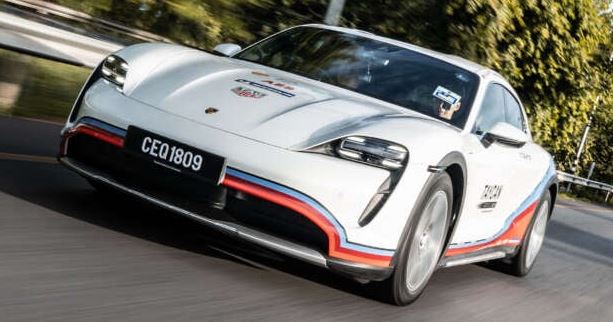From Bangkok to Singapore: Porsche’s Electrifying Road Trip
Porsche, the famous German carmaker, has achieved an incredible feat by setting a new record for the fastest electric vehicle (EV) journey from Thailand to Singapore. They completed this remarkable journey in just 29 hours and 15 minutes using their high-performance Porsche Taycan 4S Cross Turismo.
The journey was taken on by a team of three journalists, each representing their own country – Pan Eu Jin from Malaysia, Pholpat Salayakanond from Thailand, and Desmond Chan from Singapore. Together, they covered a long distance of 1,845 kilometers during this historic adventure.
This remarkable journey was called the “Taycan Record Run.” The three journalists took turns driving the Porsche Taycan 4S Cross Turismo to make sure they kept making progress towards their destination. Along the way, they took short breaks to recharge the EV, planning these stops carefully to make the journey more efficient and reduce downtime.
The Porsche Taycan 4S Cross Turismo used for this record attempt is equipped with the Performance Battery Plus specification and had a software update in 2022. This update brought several improvements, including better thermal energy management, selective front-axle motor de-coupling, and enhanced energy recuperation strategies. As a result of these enhancements, the Taycan achieved an impressive WLTP-rated range of 512 kilometers, making it possible for them to have an extended and uninterrupted journey.
To recharge the EV during the journey, Porsche used the Shell Recharge HPC network, which consists of powerful ABB chargers that can deliver outputs ranging from 180 kW to 360 kW. The Taycan’s advanced 800-volt electrical architecture allowed them to complete each charging interval in just 25 minutes, making the recharging process quick and efficient.
The exciting journey began at a Shell Recharge station located in Bang Yai, on the outskirts of Bangkok, Thailand. Before starting their record attempt, the Taycan was charged at the station’s ABB 360 kW DC charger. The official timing, closely monitored by TAG Heuer, the timekeepers for the event, started at 4:00 am local time as the three drivers began their ambitious journey.
Throughout the journey, Porsche followed all the speed limits to make sure the record attempt was valid. They didn’t provide any special benefits or incentives to the participants, and the team relied on the existing benefits available to all Porsche customers using the Shell HPC network. By reserving EV chargers up to 60 minutes before arriving, the drivers ensured a smooth and well-coordinated charging experience.
The journey took the team through various checkpoints in Thailand, including Chumphon, Nakhon Si Thammarat, and Hat Yai, before crossing into Malaysia at the Sadao customs border. The midpoint of their journey was at Porsche Centre Penang, where officials recorded a mid-way time of 17 hours and 55 minutes since their departure from Bang Yai. Here, they used the recently installed twin-175 kW DC fast chargers at Porsche Centre Penang for a quick 5% to 80% charge, taking only 23 minutes.
Continuing through Malaysia, they made two more recharging stops at the Shell Recharge station in the Tapah southbound layby and Shell Recharge Tangkak southbound before finally reaching the Tuas checkpoint into Singapore in the early hours of the morning.
The triumphant team then took the Ayer-Rajah Expressway before arriving at the SG50 lattice structure within the Gardens by the Bay in Marina Bay, Singapore. The official arrival time at the destination was recorded at 10:15 am, and the authenticated timing sheets showed a final time of 29 hours and 15 minutes for the entire journey.
This remarkable achievement not only demonstrates the impressive capabilities of the Porsche Taycan 4S Cross Turismo but also shows the potential of electric vehicles for long-distance trips. Porsche hopes that by setting this record, they will inspire further progress in the EV industry and encourage more sustainable transportation solutions for a greener future.

